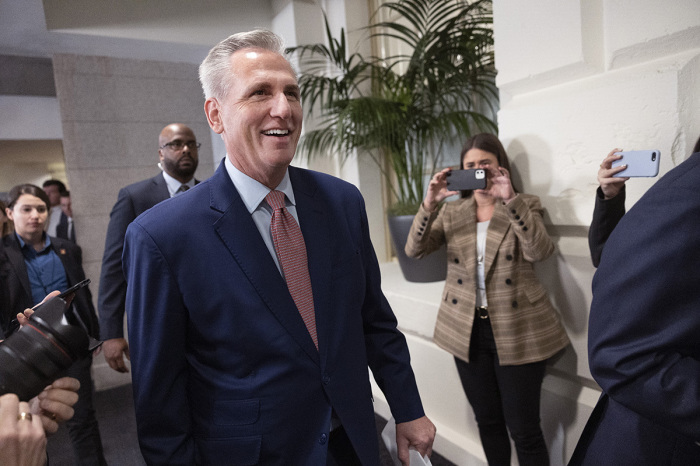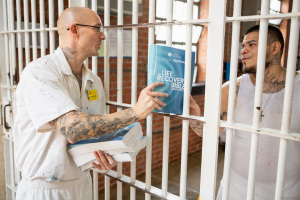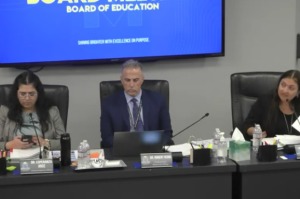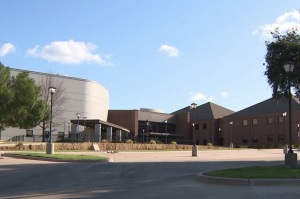House adjourns after Kevin McCarthy falls short in third vote for speaker

The United States House of Representatives failed to elect a speaker for the 118th Congress on Tuesday, as Republican Rep. Kevin McCarthy of California was unable to get the necessary number of votes in support of his bid.
For the first time since 1923, the Republican majority was unable to elect a new House Speaker on the first ballot, despite McCarthy being the favorite to win the position.
McCarthy was first nominated by Rep. Elise Stefanik of New York, chair of the Republican Caucus, with her floor announcement receiving much applause by members of the GOP.
Stefanik championed McCarthy’s time as minority leader in the House, stating that he “has taken the fight to one-party Democratic rule on behalf of the American people.”
“A proud conservative with a tireless work ethic, Kevin McCarthy has earned this speakership of the people’s house,” Stefanik declared.
While McCarthy was expected by many to become the next speaker, he faced key opposition from multiple Republican congressmen, among them Rep. Andy Biggs of Arizona.
Biggs had announced his intention to run for speaker last November, explaining in a statement at the time that he was “about changing the paradigm and the status quo.”
“Minority Leader McCarthy does not have the votes needed to become the next speaker of the House and his speakership should not be a foregone conclusion,” Biggs stated. “There are reforms that must be made in the House in order to facilitate representation of our constituents. Items such as allowing members to move to amend bills, only allowing bills that cover a single subject, and requiring bills to go through committees before bringing them to the floor.”
Biggs also felt that members of the House “must also be granted more time to read the legislation and debate the merits of it.”
In response to Republican critics, McCarthy wrote a letter in advance of Tuesday’s vote pledging to “work with everyone in our party to build conservative consensus,” according to The Washington Post.
“It’s time for our new Republican majority to embrace these bold reforms and move forward as one,” wrote McCarthy.
“That’s why on January 3 — and every day thereafter — I stand ready to be judged not by my words, but by my actions as Speaker.”
On the first ballot, McCarthy received 203 votes, while Biggs received 10 votes, Jordan received six votes and other elected officials received the rest.
After the first ballot results were announced, Jordan addressed Congress and expressed his endorsement of McCarthy, advocating for conservative policies during his remarks.
After Jordan spoke, however, Republican Rep. Matt Gaetz of Florida proceeded to nominate Jordan, and expressed his intention of voting for Jordan for the second ballot.
On the second ballot, McCarthy again received 203 votes and failed to get the necessary majority, while Jordan, who had earlier endorsed McCarthy, received 19 votes.
For the third ballot, Rep. Steve Scalise of Louisiana nominated McCarthy while Rep. Chip Roy of Texas nominated Jordan.
McCarthy saw his lead slightly decrease to 202 votes, while Jordan received 20, due to Rep. Byron Donalds of Florida changing his vote.
"The reality is Rep. Kevin McCarthy doesn’t have the votes. I committed my support to him publicly and for two votes on the House Floor. 218 is the number, and currently, no one is there. Our conference needs to recess and huddle and find someone or work out the next steps," tweeted Donalds shortly after voting in the third ballot.
During the same session, Democrat members of the House officially elected Rep. Hakeem Jeffries of New York as the new House Minority Leader, with all 212 voting for him.
Rep. Pete Aguilar of California, chair of the Democratic Caucus, gave remarks on the floor in support of Jeffries, spotlighting his religious convictions and his being a regular church attender.
“He is guided by every step of the way by his faith that his mom instilled in him,” stated Aguilar. “Hakeem goes to church every weekend, sometimes that one where his church family is at Cornerstone Baptist, or somewhere else in the District, where he can meet his constituents where they are.”




























